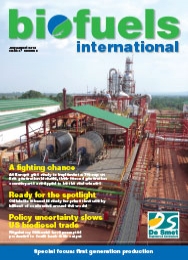
Volume 8, Issue 4
Published: July 1, 2014
Policy certainty coming to the EU
On the 13 June, the EU Committee of Permanent Representatives (COREPER) reached a decision on measures relating to the indirect land use change (ILUC) in the EU biofuels policy, which includes a 7% cap...
Application of anti-dumping duties widened
The European Commission (EC) has reached a decision to apply anti-dumping duties on all US ethanol which enters the European Union (EU) through Norway. The ruling comes as a result of US exporters shipping...
US states urge review of California's LCFS
In April this year, 21 US states filed a brief requesting the Supreme Court to review a lower court decision to challenge the Low Carbon Fuel Standard, which sets out that carbon intensity in transportation...
National Climate Assessment contradicts 2014 RFS proposal
In response to comments from the White House National Climate Assessment, released on 6 May, the world’s largest trade association representing biotechnology companies, academic institutions and...
Current price index
The European ethanol market initially looked as though it might reach the end of May fairly unchanged. However, following a round of producer investment and purchasing, prices increased. Margins have been...
Policy uncertainty again slows US biodiesel trade
The US biodiesel industry continues to notch successes, which includes the country’s largest producer, Renewable Energy Group (REG), announcing in late April that it reached 1 billion gallons in...
Overcoming adversity
The verdict on biofuels is in and the catchphrase seems to be ‘overpromised and under delivered’. First generation biofuels made out of sugar, starch and edible oils still occupy a major share...
Second never felt so good
Despite the production of first generation biofuels occupying a considerable proportion of the biofuels market, producers are now taking a progressive approach towards second generation production in light...
A fighting chance
On 13 June, the European Union Energy Council met to finalise its decision to incorporate indirect land use change (ILUC) into EU biofuel policies and to limit the production of first generation biofuels...
The triumph of KISS
The ‘keep it simple, stupid’, or KISS, principle states that most systems work best if they are kept simple rather than made complicated. Simplicity, therefore, should be a key goal and unnecessary...
Ready for the spotlight
Fossil-fuel dependence presents several problems, two of which appear inescapable: fossil fuels are a finite resource that are increasingly expensive to extract and process, and their carbon-rich nature...
A new light in Australian ethanol production
Ethanol is currently commercially produced in Australia from wheat starch, red sorghum grain and sugarcane molasses. There are three main ethanol producers with a combined annual production capacity of...
Remaining enzyme-free
Biomass is increasingly cited as a potential alternative to nonrenewable, petroleumbased resources, particularly as worldwide environmental, economic and political threats tied to our reliance on fossil...
Next generation enzymes
The global population, which will surpass eight billion by 2030, is expected to consume over 30% more energy than today1. With oil reserves declining and greenhouse gas (GHG) emissions from fossil fuels...
The evolution of enzymatic biodiesel
US-based Viesel’s first batch of ASTM D6751 specified biodiesel rolled out of its facility in July 2013. At that point it was producing at a rate of one or two trucks a week, a reflection of both...
More ethanol, less grain
Starch-based ethanol production is a business that requires patience, courage and a stubborn solutions-oriented mentality. Creating a profitable business is often a challenge. Rumours of changes in the...
Bitter disappointment for biodiesel
After the imposed anti-dumping measures against Argentina and Indonesia at the end of 2013, the expectations of European biodiesel producers were set high. All anticipated that the ceasing of soya- and...
Benefitting from by-products
Biodiesel production has been promoted by a number of governments around the world and major programmes for its manufacture have been announced. Irrespective of the politics or the implications of the...
The glycerine glut
At approximately 2,000 years old, glycerine is one of the oldest chemical compounds used by mankind. The glycerine industry has been around for hundreds of years and over that time the supply and demand...
Critical considerations
To be sustainable in a challenging and volatile marketplace, vegetable oil facilities should be prepared to process a number of locally produced materials and create a diverse product set. Vegetable oil...
A quicker way
At the heart of the biodiesel industry is a simple transesterification chemical reaction, which allows for the conversion of oils to a usable liquid fuel with similar combustion properties to regular petroleum...
Ready, set, go enzymes
With the lapse of the US biodiesel tax credit this year and the ambiguity around the Environmental Protection Agency’s (EPA) current Renewable Fuel Standard (RFS) proposal, many biodiesel producers...
Looking to the future
Biodiesel is traditionally produced via esterification of fatty acids and transesterification of triglycerides with an alcohol such as methanol and sodium methylate. The transesterification of triglycerides...
Solving algae's problems
Biodiesel fuel is based on long-chain monoalkyl (methyl, ethyl, or propyl) esters derived from plant oil or animal fat. These fatty acid esters are usually formed by reacting alcohol with the lipids extracted...
A one stop shop
Turning a vegetable oil biofuel plant into one that is feedstock flexible is essential for many biodiesel producers today in order to remain profitable. As the modification of a single unit in an existing...
Sustainability assurance systems: A strategic review
The biofuels sector, although having already come through a period of uncertainty, faces continuing turmoil. While biofuel targets exist courtesy of the Renewable Energy Directive (RED) in Europe, future...
A perfect storm
The biofuels sector is in turmoil. This politics-laden topic has been losing public and regulator interest for a while and, technology and environmental issues aside, biofuels depends on attention. Appearing...
The importance of biodiesel stabilisation
About 23 million tonnes of biodiesel are used worldwide and further growth is expected, especially in the Asia-Pacific region and Latin America. New and higher mandates for biofuels in countries such as...












